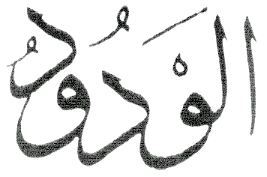

According to Dr Sharib:
Al-Wadud is the One Who loves. He says that some say Al-Wadud is the One
Who confers an abundance of blessings upon those obedient to Him.
To emulate the name we are advised to prefer the good of others over our
own good - in other words to prefer social good over personal good, and that
we should treat others as we would like to be treated.
Appropriate recitation secures the love of Allah and makes one beloved by
Allah. Appropriate use of the name can assist in creating love between
husband and wife.
see 'The 99 Most Beautiful Names of Allah' by Dr Zahurul Hassan Sharib
Some other references:
"But ask forgiveness
Of your Lord, and turn
Unto Him (in repentance)
For my Lord is indeed
Full of mercy and loving-kindness."
Al-Ghazali says that : "Al-Wadud is one who wishes all creatures well and
accordingly favours them and praises them."
He points out that it differs from 'the Merciful' in not requiring a recipient who is
needy of it - it is given freely at the outset.
God's loving-kindness is free from motives that may be found in man.
In considering man's part in this Al-Ghazali emphasises that, at its best, it
consists of altruism that is unaffected by the response of the recipient. He
quotes the holy Prophet's words to Hazrat Ali when he said:
"If you want to take precedence over those who are close to God, then be
reconciled with those who broke with you, give to the ones who excluded you,
and forgive the ones who wronged you."
(Al-Ghazali - The Ninety-nine Beautiful Names of God. Trans. Burrel/Daher: ITS: 1992.)
'Love thy neighbour as thyself.'
'Love thine enemy.'
Lord Jesus Christ
"The best of mankind is he who benefits men."
Mevlana Jalaluddin Rumi
"May it be, O Lord, that I seek not so much to be consoled as to console, to be
understood as to understand, to be loved as to love: because it is in giving
oneself that one receives; it is in forgetting oneself that one is found; it is in
pardoning that one obtains pardon; it is in dying that one is raised up to
eternal life."
St. Francis of Assisi - [from A Treasury of Traditional Wisdom. (ed. W.Perry) Quinta Essentia: 1971]
The term from contemporary psychology that seems to fit most well this name
in its human dimension is 'unconditional regard' or 'unconditional love'. Love
that is given without any condition attached or expectation involved. That is to
forgive before an act is committed against us, to help when we know that help
will not be appreciated, to care for the one who does not even know we care,
to labour for the welfare of others when they are unaware of our labours, and
in doing so still to count ourselves as selfish whilst we ourselves know. Thus
forgetting is the better part of forgiving, helping, caring and labouring. Khawaja
Muinuddin Hasan Chishti said that our morning meditation should be so deep
that we forget even the deeds of the night before.
JMZ
Al-Wadud is the One Who loves. He says that some say Al-Wadud is the One
Who confers an abundance of blessings upon those obedient to Him.
To emulate the name we are advised to prefer the good of others over our
own good - in other words to prefer social good over personal good, and that
we should treat others as we would like to be treated.
Appropriate recitation secures the love of Allah and makes one beloved by
Allah. Appropriate use of the name can assist in creating love between
husband and wife.
see 'The 99 Most Beautiful Names of Allah' by Dr Zahurul Hassan Sharib
Some other references:
"But ask forgiveness
Of your Lord, and turn
Unto Him (in repentance)
For my Lord is indeed
Full of mercy and loving-kindness."
Al-Ghazali says that : "Al-Wadud is one who wishes all creatures well and
accordingly favours them and praises them."
He points out that it differs from 'the Merciful' in not requiring a recipient who is
needy of it - it is given freely at the outset.
God's loving-kindness is free from motives that may be found in man.
In considering man's part in this Al-Ghazali emphasises that, at its best, it
consists of altruism that is unaffected by the response of the recipient. He
quotes the holy Prophet's words to Hazrat Ali when he said:
"If you want to take precedence over those who are close to God, then be
reconciled with those who broke with you, give to the ones who excluded you,
and forgive the ones who wronged you."
(Al-Ghazali - The Ninety-nine Beautiful Names of God. Trans. Burrel/Daher: ITS: 1992.)
'Love thy neighbour as thyself.'
'Love thine enemy.'
Lord Jesus Christ
"The best of mankind is he who benefits men."
Mevlana Jalaluddin Rumi
"May it be, O Lord, that I seek not so much to be consoled as to console, to be
understood as to understand, to be loved as to love: because it is in giving
oneself that one receives; it is in forgetting oneself that one is found; it is in
pardoning that one obtains pardon; it is in dying that one is raised up to
eternal life."
St. Francis of Assisi - [from A Treasury of Traditional Wisdom. (ed. W.Perry) Quinta Essentia: 1971]
The term from contemporary psychology that seems to fit most well this name
in its human dimension is 'unconditional regard' or 'unconditional love'. Love
that is given without any condition attached or expectation involved. That is to
forgive before an act is committed against us, to help when we know that help
will not be appreciated, to care for the one who does not even know we care,
to labour for the welfare of others when they are unaware of our labours, and
in doing so still to count ourselves as selfish whilst we ourselves know. Thus
forgetting is the better part of forgiving, helping, caring and labouring. Khawaja
Muinuddin Hasan Chishti said that our morning meditation should be so deep
that we forget even the deeds of the night before.
JMZ







| Bismillah ir Rehman ir Rahim |
| The Wise, The Ultimately Wise One, The Decider. |




Wastagh-firuu Rabba-kum
summa tuu-buuu 'ilayh:
'inna Rabbii
Rahiimunw-waduud.
(Qur'an 11:90 trans. Y. Ali)
summa tuu-buuu 'ilayh:
'inna Rabbii
Rahiimunw-waduud.
(Qur'an 11:90 trans. Y. Ali)

| Al-Wadud (Al-Wadood) Qur'an 11:90 |
| The Loving The Objectively Loving One, The Loving-kind |
